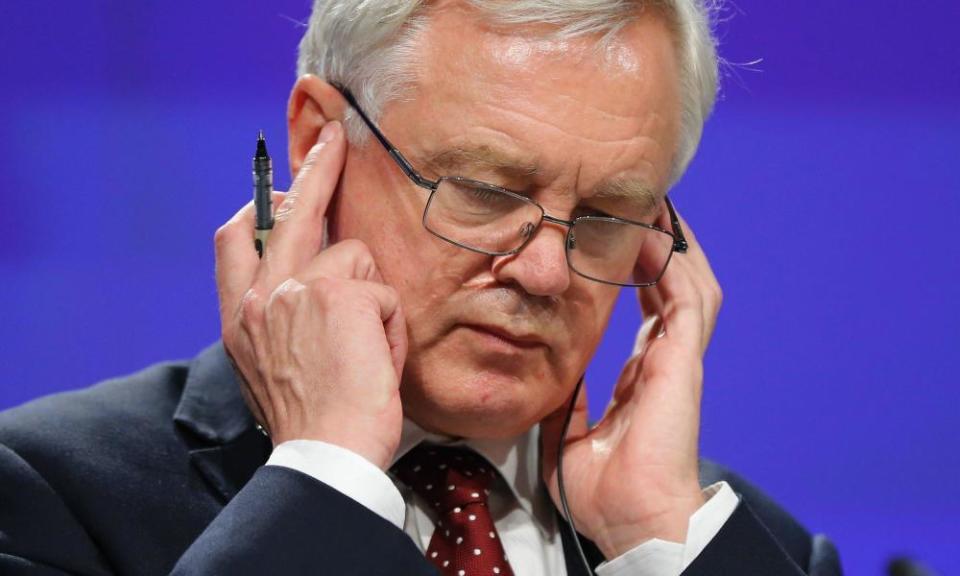Brexit talks: the key dividing lines between Britain and the EU

Divorce bill
The most bitter arguments in a divorce are often about money, and Brexit is no exception. The EU wants Britain to agree a “single financial settlement” covering debts and unpaid bills accrued over 44 years of membership. The British acknowledged last week they have “obligations” to the EU, a move seen as a breakthrough on both sides.
The bill is mooted to be €75bn (£67bn), although the EU’s chief Brexit negotiator, Michel Barnier, has never confirmed any number and will not press for the UK to sign on the line until the final phase of talks. Instead, the EU wants the British to agree on a methodology to work out the sum.
The British have frustrated the EU side by not revealing which obligations they own up to. “We make better progress when our respective positions are clear,” Barnier said at a joint press conference with David Davis on Thursday. He added that an agreement could not be achieved “through incremental steps”, a barely-coded call for the British to come back to Brussels next time with a detailed offer on money.
Davis did not reveal any details. He may have also unnerved his EU hosts when he clarified controversial remarks by the foreign secretary, Boris Johnson. “I think he said ‘they could go whistle for extortionate demands’,” Davis said, going on to say that the UK would meet its “international obligations”.
The European court of justice
It was no secret that the EU and UK were heading for a bruising conflict over the European court of justice. The court’s role in British life after Brexit has proved to be one of the sharpest divides so far. Theresa May has vowed to end ECJ jurisdiction, a totemic issue for Tory Brexiters, including cabinet ministers such as Michael Gove.
The EU, however, thinks only the European court can guarantee the rights of 3.5 million EU nationals living in the UK after Brexit. Describing the issue as a “fundamental divergence”, Barnier said “quite frankly, as far as we are concerned we can see no other way in which we can guarantee continuation of European rights [for EU nationals] … Only the court can interpret EU law, it is not a choice, it is an obligation. We want our citizens to be protected by EU law.”
The ECJ creeps into other areas of the Brexit divorce treaty: the EU wants the court to play a role in settling any disputes over goods in transit on Brexit day – which is scheduled for the end of March 2019 – as well as making sure pending British cases are concluded before the court. Just because the conflict was expected does not make it easier to solve.
Citizens’ rights to move
The EU and UK both stress they want an early and detailed deal to protect the rights of nearly 5 million citizens caught on the wrong side of the Brexit divide. After the first week of detailed talks, significant uncertainties remain for 3.5 million EU nationals in the UK and 1.2 million British people on the continent.
One sticking point is the right to move around the EU after Brexit. British people living in the EU could lose the right to live in another member state after Brexit, while European citizens may find it hard to return to the UK if they leave for more than two years.
Under the current EU offer, British citizens living in France would be unable to move without permission to Germany, Spain or any other EU country. Under the current UK offer, an EU national living in Britain would find it difficult to return to the UK after a two-year absence, unless they could prove significant ties, for example a Polish student studying in Poland with family in the UK.
The British side think their offer is more generous, but have not revealed whether they are prepared to fight for this right for the 1.2 million Britons in Europe. The EU say it is a matter for negotiations: they want EU nationals to have an open-ended right of resettlement in the UK.
Criminal record checks
Britain wants to carry out criminal record checks on every EU citizen applying for “settled status” to remain in the UK, an idea that has angered campaign groups for EU nationals. EU officials think is too sweeping and people should only be checked when there is reasonable suspicion.
Existing EU law allows governments to expel EU nationals on the grounds of health or public safety, whether an offence was committed before or after their arrival. The UK would like EU criminals to be subject to British immigration law after Brexit, meaning they could be expelled under the UK’s own rules. EU officials say they need more information on this proposal.
Documentation
The UK would like every citizen covered under the Brexit divorce treaty to have a document proving their status. The British side thinks citizens will want to show authorities they are protected under the Brexit divorce deal, for example when claiming healthcare or applying for a university place. This is why the UK is asking EU27 nationals to apply for “settled status”. The EU’s starting point is that existing administrative procedures are adequate. This technical question will have to be resolved in a future round of negotiations.
Ehic card
The UK hopes to persuade the EU to allow British citizens to keep the European health insurance card. Currently, British travellers with the cards can claim free or low-cost health care when visiting the continent, which helps avoid having to buy health insurance. An estimated 27 million Britons have the card. The EU member state providing treatment is able to claim back costs from the patient’s home country. Britain is pressing for “an ongoing arrangement akin to the Ehic scheme”. The EU says it needs to study the issue further.

 Yahoo News
Yahoo News 